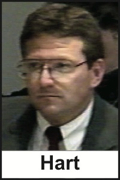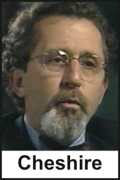 July 8, 2013
July 8, 2013
“As the parents made their case to the (North Carolina Parole Commission), prosecutors and defense attorneys continued sparring over whether the state had reneged on the plea bargain by trying to block (Betsy) Kelly’s parole.
“Kelly’s attorney, Joe Cheshire V, says prosecutor William Hart promised not to contest her parole if she agreed to the no-contest plea. Hart says the state never made such a pledge.
“Hart and assistant prosecutor Nancy Lamb attended the hearing to support the parents. They say it would be inappropriate for Kelly to be released, because she continues to publicly proclaim her innocence.
“ ‘The parents know she is guilty,’ Lamb told reporters before the hearing. ‘They know what their children have gone through.’
“Cheshire, continuing to maintain his client’s innocence, said Hart should have tried Kelly in court if he wanted to show she was guilty.
“ ‘He was afraid to do that,’ Cheshire said. ‘And now he’s running around saying that since she won’t admit her guilt, she should not get paroled. I think that’s pretty pathetic.’ ”
– From “Parents oppose parole for Little Rascals operator” in the News & Observer (April 12, 1994)
Pandering, bullying, grandstanding, double-crossing – in thwarting Betsy Kelly’s parole, the Little Rascals prosecutors scored a grand slam of misfeasance.
Here’s what Joe Cheshire recalls about that brutal day:
 “Simply taking that plea was distasteful to me, but when the awesome power of government meshes with the awesome power of the judiciary and neither want to find the truth, but instead to consummate a decided outcome, the individual gets ground up in the process.
“Simply taking that plea was distasteful to me, but when the awesome power of government meshes with the awesome power of the judiciary and neither want to find the truth, but instead to consummate a decided outcome, the individual gets ground up in the process.
“Betsy was desperate to come home and did not trust anyone, nor should she have. I am not a fool; I would not have agreed to such a plea if it did not insure her freedom. The only (apparent) risk was the Parole Board. The prosecutor had agreed to not oppose her parole, but then he reneged. He knew that our only alternative was to move that the plea be set aside and that we would not be in a position to do that.
“Yes, in retrospect I should not have trusted him…. But he was not willing to put it in writing, and (insisting on that) would have ended the negotiations….”
Little Rascals prosecutors seemed perversely unable to let any defendant go home without administering a final cheap shot. When Scott Privott was released under a no-contest plea deal in 1994, they added a last-minute stipulation that he undergo psychiatric evaluation as part of his five-year probation.
“I saw them weekly for about two months,” Privott recalls, “and then they reported that I was normal. My probation officer told me (Bill) Hart was pissed… and that was that.”
